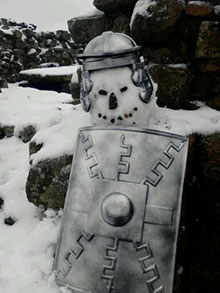Having myself worked with archaeologists, I know just how excited they get whenever a latrine turns up. Excitement assured, then, with this headline.
“ROME — Archaeologists picking through latrines, sewers, cesspits and trash dumps at Pompeii and Herculaneum have found tantalizing clues to an apparently varied diet there before the eruption of Mount Vesuvius destroyed those Roman cities in 79 A.D.
Much of what residents didn’t digest or left on their plates went down into latrine holes, became remnants in cesspits built up over the centuries or was thrown away in local dumps. At a three-day conference ending Friday in Rome, archaeologists discussed their discoveries, including gnawed-on fish bones and goose eggshells that were possibly ancient delicacies for the elite……………..
a latrine entry shaft into a sewer with calcium phosphate build-up on the side.
Filed under: Uncategorized | Leave a comment »



